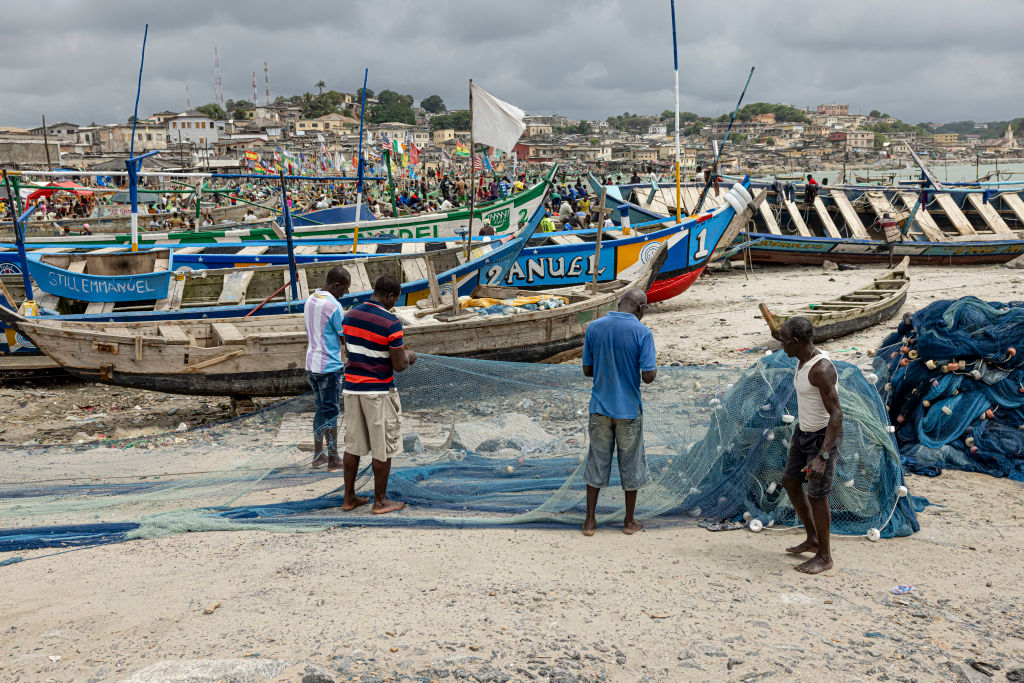ADF STAFF
Sweat beaded on George Kowukumeh’s forehead as he strained to pull a fishing net ashore in Accra, Ghana.
A longtime fisherman, Kowukumeh was dismayed with his haul. He has felt the emotion often in recent years, as total landings of small pelagic fish, a staple of the national diet, fell by 59% between 1993 and 2019.
The trend continues due to the continuous influx of large foreign industrial trawlers — mostly Chinese — that indiscriminately catch all manner of marine life, as well as the effects of climate change.
“The catch today is disappointing and full of garbage,” Kowukumeh told the Pulitzer Center. “Several hours of very hard work has produced less than 500 cedis ($62) worth of fish for the nine-member crew. What do we do with this?”
Kowukumeh’s predicament is common in fishing communities in West Africa, where 7 million people depend on fish for food and employment.
Artisanal fishermen from Côte d’Ivoire to Nigeria say Chinese trawlers commonly destroy the nets and gear of local fishermen. The trawlers employ illegal fishing practices, such as bottom trawling, which destroys ecosystems critical to the survival of marine life. They also fish with lights and explosives, and fish in prohibited areas and during closed seasons.
China commands the world’s largest distant-water fishing fleet and is the world’s worst illegal, unreported and unregulated (IUU) fishing offender, according to the IUU Fishing Index. Of the top 10 companies engaged in illegal fishing globally, eight are from China.
The effects of IUU fishing on fish populations are acute. In Côte d’Ivoire, for example, yearly overall catch plummeted almost 40% between 2003 and 2020, due largely to illegal fishing, Robert Paarlberg, an associate in the sustainability science program at
Harvard Kennedy School, wrote in The Conversation.
According to the International Collective in Support of Fishworkers, illegal fishing also has led to the loss of more than
300,000
artisanal fishing jobs in West Africa. Some countries, such as Senegal, sign fishing agreements with Chinese companies, to the chagrin of locals.
“Our government has signed these fishing agreements and issued licenses to other trawlers to operate on our waters,” Senegalese fisherman Siaka Fai told China Dialogue. “They have the bigger capacity, and we even compete with them around the areas we can access. As a result, small-scale fishers would [return] with very minimal catch, which is frustrating.”
Climate change, particularly ocean warming, is also driving fish from the region, Paarlberg wrote. Warmer ocean waters hold less oxygen, which threatens all marine life. Warmer waters also force cold-blooded fish to migrate when temperatures are too high.
“Fish catch is strongly related to surface water and atmospheric temperatures,” Opoku Pabi, lecturer and senior research fellow at the Institute for Environmental and Sanitation Studies at the University of Ghana, told the Pulitzer Center. “Generally, the lower the temperatures, the higher the fish catch.”
In Ghana, some fish species that account for the highest catches, such as snapper, Congo dentex and grouper, are highly sensitive to climate change. And species caught by artisanal fishermen are generally more sensitive to climate change than those captured by semi-industrial and industrial fleets, according to the Journal for Coastal Conservation.
Studies have found that the maximum catch potential for Côte d’Ivoire, Ghana and Nigeria could drop by about 50% by mid-century.
Artisanal fishermen also contribute to depleted fish stocks but to a far less extent. The number of artisanal canoes operating in West Africa has actually increased, despite the lack of fish. In Ghana, there were 8,000 artisanal canoes in 1990. The number increased to 13,650 by 2017. Last year, the country imposed a three-year moratorium on new artisanal canoes entering the marine sector to help replenish fish populations.
“With this measure, it is expected that the pressure on our fisheries resources — in addition to the other measures government is implementing — will all contribute to a reduction of the pressure on our fisheries resource, in order to recover the overexploited small pelagic stock,” Mavis Hawa Koomson, Ghana’s minister of fisheries and aquaculture development, said in a report by Ghanaian newspaper The Business & Financial Times.

